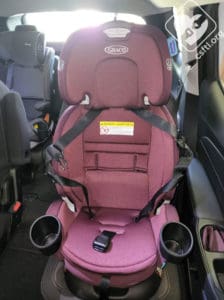Car Seat Basics: Strategies for Buckling Spirited Littles

(Last Updated On: January 30, 2023)
I refuse to be buckled into my car seat!
A few years ago we published our best tips for stopping car seat escape artists. But what do you do when you can’t manage to get your Little buckled into their seat in the first place?
This may seem preposterous to caregivers who have never been through the struggle with their kids, but it’s a fairly common stage for many toddlers. Suddenly your baby has developed Hulk strength, and it feels impossible to deal with them arching their back, going stiff as a board, or kicking wildly as soon as you try to buckle them in.
Often the struggle stems from the fact that these littles are too young to clearly express their frustration with their words. They also may not be old enough to be reasoned with or even bargained with. How can you survive this stage with a child who has strong muscles and even stronger willpower? We have no idea where they could have acquired this stubbornness…
Selecting a Seat for a Child Who Fights Being Buckled

Evenflo Revolve360
If you’re planning to purchase a new car seat for your child (often because they’re outgrowing their previous seat or it has been in a crash), there are a couple of factors to consider if you’re having the car seat struggle on a regular basis.
You might prioritize a seat with lower sides to make the loading process easier. A seat that includes pockets or magnets for the buckle tongues can help to hold the harness straps out of the way so that they don’t get buried under your squirming child. Some car seats have a pad on the crotch buckle that keeps it tipped forward when not in use, which can make it easier to buckle quickly. Caregivers may also turn to a rotating car seat (see what we did there?) to prevent the child from bracing their legs against the vehicle seat back when they’re loaded into the car.
Best Case Scenario: Convince Them to Be Buckled
Cooperation is generally easier than fighting. Ideally, you’ll find a miraculous way to persuade your strong-willed child to cooperate without having to physically wrestle them into their car seat.
Check Both the Child and the Seat
First, ensure that the child isn’t fighting against getting in their seat because it’s causing them discomfort or pain. Check the seat itself. Is a toy or rock stuck under the seat’s cover? Are the buckles hot? Is the crotch buckle in the wrong slot, or are the harness straps at the wrong height? Then, check the child for potential pain points. Is a rivet on their pants digging into their skin? Is their waistband too tight? Do they have a dirty diaper?

I refuse to be buckled into my car seat!
Provide a Sense of Independence
Once you’re sure there’s nothing that could make the car seat uncomfortable, it’s time to move on to persuading your child to get in the seat. Many kids this age thrive on a sense of independence – let them climb into the seat on their own. Teach them how to buckle themselves and let them help you with the process. Count how quickly they’re able to climb into their seat and get buckled.
Create a feeling of choice however you can so that your young passenger has the impression that the decision to get buckled in the seat is theirs. Suggestions: give them the option of getting into their seat now or in two minutes. Offer to swap their seat with a sibling’s if it’s a safe option for them. Let them choose the music for the ride once they’re buckled.
Use Incentives to Reinforce Behavior
The same incentives we mentioned for preventing escape artists also apply here. Plan a fun outing that will motivate them to get into their seat without a struggle. Come up with a reward system, and praise their positive behavior. Have designated toys or soft books that they’re only allowed to use in the vehicle.
Win the Battle by Choosing your Battles

I refuse to be buckled into my car seat!
While this applies to so many parts of parenting, it also works here. If this type of reinforcement isn’t working to stop the battles over getting buckled into the seat, here’s one possible suggestion: reduce drives where possible until this phase passes. Offer to host the play date instead of driving your kiddo to a friend’s house. Cook at home or order food delivery instead of picking up takeout. Consider using a grocery delivery service if it’s available in your area. Rely on friends, family, or babysitters to care for your child during your necessary outings.
Limiting drives in this way isn’t feasible for many families, but some may have the flexibility to pick their battles when it comes to frequent car rides.
Urgent Trips
Sometimes there’s no other option but for your child to get buckled– NOW. You need to take them to a doctor’s appointment. You have to drop them off at daycare so that you can go to work. They’re riding to the co-parent’s home or to court-ordered visitation. It can be daunting to know that you’ll have to physically force your child into their seat against their will and despite their protests. As much as it feels uncomfortable to wrestle your child into their seat, keeping them safe is a non-negotiable.
Prepare Physically and Mentally
If getting in the car is mandatory, we recommend the Yoda philosophy: “Do, or do not, there is no try.” Don’t give up once you start the process – you may risk reinforcing your child’s behavior of fighting their car seat. When your child knows that they’ll win the fight by outlasting your willpower, they’re more likely to continue the struggle. If you’re able to find a workaround that works for you and your child, this cooperation can pave the way for fewer struggles in the future.
Leave Early
One helpful tip is to head out to your vehicle earlier than usual. We’re well aware of how challenging this can be with littles in tow. If it’s possible for your family, those extra seconds or minutes could makes all the difference to avoid rushing out the door when you’re already feeling stressed and running late. Give yourself the time you need to approach the situation with patience instead of panic (even if it means not getting to hit snooze when the alarm rings!).
Set up the Car Seat

Graco Turn2Me harness open
Prepare both your child and their seat before you begin. Loosen the harness fully so that you have more room to maneuver the straps around your child’s arms. Fix any twists in the harness and lift the buckles out of the seat pan. Remove any bulky clothing from your child that won’t be safe to wear in the car seat. You might also think about removing their shoes so their kicking and flailing is less likely to injure you.
Buckle Them in Without Hurting Them (or Yourself)
One option is to try the taco hold. Here’s how: lift your kiddo up and hold them with their knees to their chest. This prevents them from arching their back. Put them into their car seat with their bum against the back of the seat, and buckle one side of the crotch buckle as quickly as you can. We find that buckling the crotch buckle first is the key to any challenging situation when it comes to buckling sassy toddlers into their car seats.
Some parents find it helps to put one hand on the seat pan between the child’s legs until the crotch buckle is connected. This approach will stop them from being able to slide out of the bottom of the seat or flip over while you do the chest clip and tighten the harness.
Some caregivers also find tickling a useful tool with a child who stiffens their back and legs to avoid being put into the seat. A quick tickle on the belly or under the arms can force them to relax their stiff muscles, giving the adult a brief window of time to get them buckled.
You Can Do It!
Fortunately, for many kids, this phase of resisting the car seat passes relatively quickly, even if it feels like an eternity. It can be frustrating and discouraging to fight this buckling struggle day after day. Do your best to remember that consistency is key to winning both those daily battles and, eventually, ending the fight over the car seat for good. On the bright side, these strong-willed Littles have the grit and determination to persevere through all sorts of challenges.
Keep them safe in their car seats now so that they can grow up to accomplish great things!






